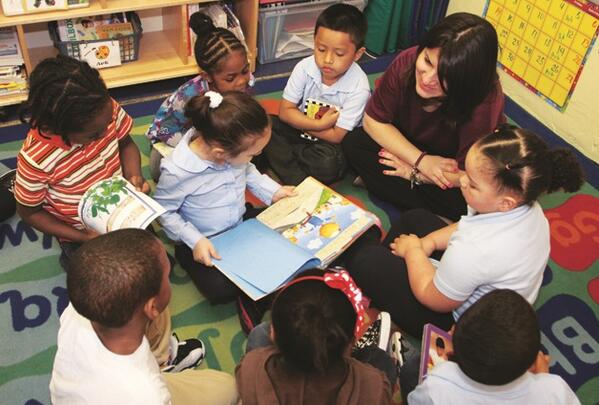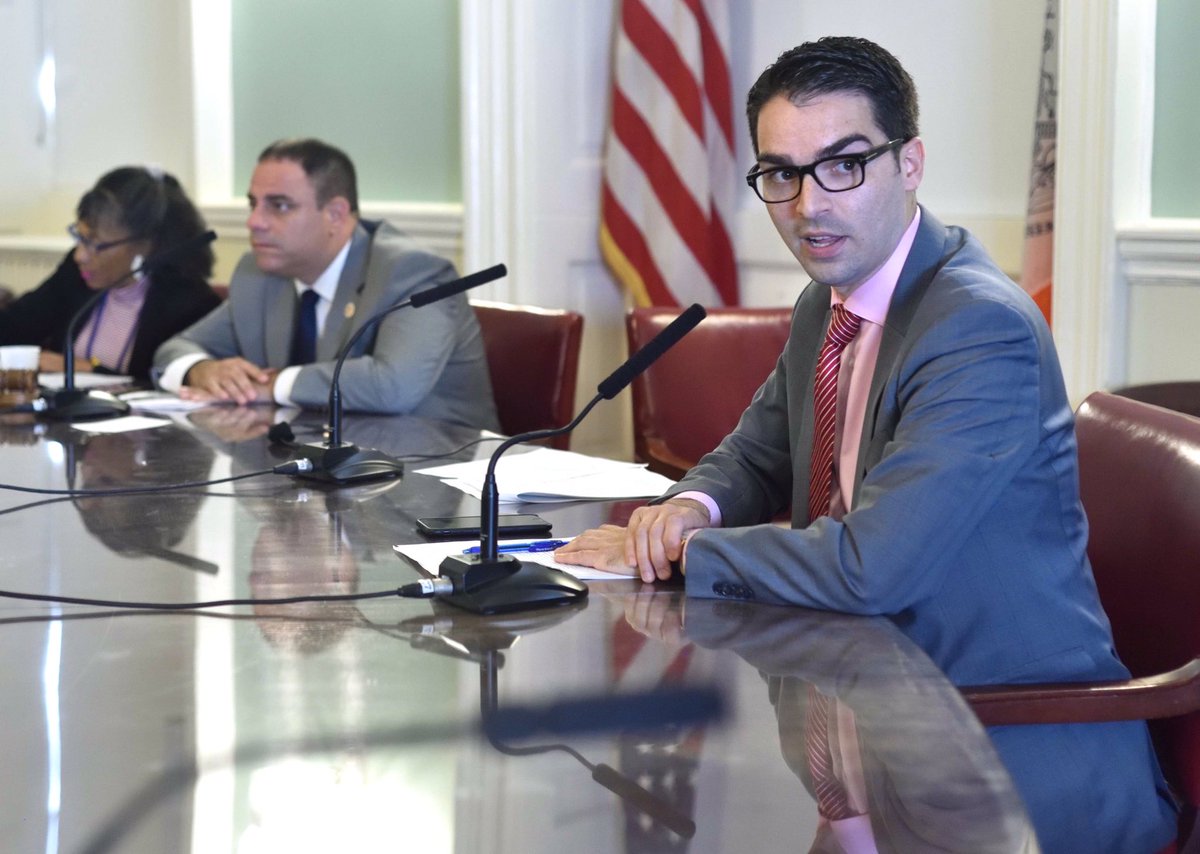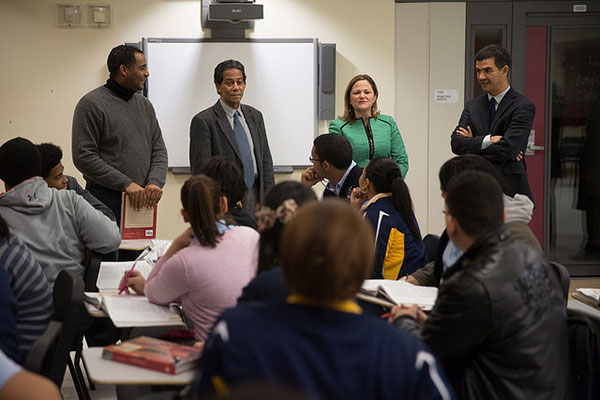Our Youngest Students Deserve Great Teachers Too

(photo via @nycgob)
When your child starts his or her very first day of school, you do everything you can to prepare them for the beginning of their educational journey. But you might be surprised to find out that a new study shows there’s a good chance your school assigns one of their lower-performing teachers to kindergarten or other earliest grades. Although research shows that the earliest grades have an outsized impact on success later in life, administrators are in some ways incentivized to push their least effective teachers to early elementary because states often don’t test students until the third grade. That means that despite all your preparation and hopes, your child may have a struggling teacher to lay the foundation for his or her future learning.
Your child deserves a great teacher practicing in their element, regardless of whether or not they’re part of a state testing grade. Instead of “shuffling” our teachers, we need to dedicate resources toward helping our educators strengthen their practice. As New York and our entire country confront a national teacher shortage, it’s more important than ever to help our teachers rise to their full potential to become lifelong, excellent educators.
From what I’ve seen, we have a long way to go. Over the last five years, I have heard colleagues across the city describe how new and developing teachers are assigned to subjects outside of their skillset and training, rather than provided with the support to excel in the subject of their expertise. The story of one of these teachers, whom I will call Mary, best exemplifies the damage this practice is inflicting on both students and teachers.
When Mary began her career teaching fifth-grade math, she was full of energy and a deep commitment to help her students grow into analytical and enthusiastic mathematicians. But, as with most first-year teachers, Mary struggled with managing her students’ behavior, hindering her students’ learning and making every day a challenge. But despite a year that tested her resolve and often brought her to tears, her optimism remained. Mary believed that if she worked hard and received support and guidance from administrators, she could grow into an exceptional teacher.
Instead, after state test results were released, she was reassigned to the untested subject of K-3 literacy enrichment, a discipline requiring an entirely different skillset from math.
What Mary needed was the targeted and consistent training all teachers deserve. What she received was neglect. Isolated and out of her element, behavior issues in her class only worsened, and her bright outlook on teaching quickly dimmed.
The good news is that some schools, such as the Lillian Weber School of the Arts where I teach, are bucking that trend, demonstrating that supporting teachers like Mary is actually quite simple and cost-effective.
These schools provide professional development opportunities tailored to meet teachers’ individual needs and empower veteran teachers to be mentors who develop meaningful and productive partnerships with their less experienced colleagues. In addition, some schools have begun forming Professional Learning Communities that allow teachers to collaborate to analyze classroom strategies, learn and master instructional practices, and fine-tune their instruction based on student data.
In my school, our administration provides over six different topics for teachers to choose from, deepening our engagement and helping us build the skills to eventually facilitate our own five-week learning community cycle on topics that were once growth areas. With these and other methods, our schools can create excellent teachers. Purposeful and consistent support allows any educator to learn the skills to give our students the fluency to become readers, the number sense to become mathematicians, and the life skills to become leaders.
The short-term goals of strong standardized test scores are often at odds with the long-term goals of creating strong, curious learners. But this does not mean we should get rid of tests. Testing is important; it provides educators and decision-makers with crucial data that inform how we teach and how they allocate resources. But unfortunately, our system can encourage administrators to make decisions to immediately boost test scores rather than based on what is best for the school overall. Instead, we must invest in programs like Title II that provide meaningful learning opportunities for teachers. Rather than displacing our developing educators, we can build effective and invested teachers.
***
Jazlyn Mena is a STEAM/Data Specialist at an elementary school on the Upper West Side and a member of Educators for Excellence. She is passionate about access to quality STEM instruction and improving school climate for New York City students.
***
Have an op-ed idea or submission for Gotham Gazette? Email This email address is being protected from spambots. You need JavaScript enabled to view it.
An End-of-Term Agenda for the City Council Veterans Committee

Council Member Ulrich (photo: John McCarten)
In early 2014, City Council Member Eric Ulrich was appointed chair the veterans committee by Speaker Melissa Mark-Viverito. At that time I wrote that no one within the veterans community knew what to expect, and as one of a few Republicans in a largely Democratic City Council, there were some who opposed Ulrich’s selection.
Fast forward nearly four years and the majority of the veterans community agrees that without his leadership and guidance, there would not have been a renewed conversation and there certainly wouldn’t have been many legislative accomplishments, particularly the creation of the Department of Veterans’ Services (DVS). I dare say that Ulrich’s record of accomplishments, along with Council Member Paul Vallone and the other veterans committee members, has been the greatest within the Council since I started as an advocate back in 1995.
With the general election coming next month and the race for the next Speaker already hot, there are some who believe that if re-elected, Ulrich may be moved to chair a new committee by the next Speaker. There are many moving part to this equation, but given the final three months of this Council’s term are upon us, there is some important veterans business to take care of.
The veterans committee held a hearing earlier this week, and with that and the ticking clock in mind, there are several topics the committee should consider holding hearings on over the coming months.
Department of Veterans’ Services: This week the veterans committee held an oversight hearing on DVS. This hearing focused on the growth and accomplishments of the agency since it came online in April 2016.
Overall, many agree that there have been a number of successes, but growing pains and confounding issues as well. While DVS leadership touted the department’s work and successes, particularly with its integrative health model (VetsThriveNYC), its work regarding housing homeless veterans, its Public Artist in Resident program, and its information and technology, many items remain.
Procurement of its VetsConnectNYC program, an online platform that will connect veterans with service providers, is still being negotiated. Veterans are concerned about information missing on DVS’ website, its lack of inclusion in the Mayor’s Management Report (MMR), which DVS reps acknowledged will be in the next report, and the functions and actual outreach of the Community Outreach Specialists.
Lastly, many veteran organizations receiving money from the City through the Department of Youth and Community Development (DYCD) have stated that DVS needs to have autonomous control over contracts to speed up the contracting processing and disbursement of funds, particularly for those veteran organizations that have unique contracting situations. This issue should be considered for a separate hearing with the Council’s finance committee.
Veteran Treatment Courts: Almost two years ago the committee held a hearing regarding Veteran Treatment Courts throughout the city; as well as Council Member Rory Lancman’s proposed legislation calling for the creation of a Veterans Legal Task Force to study veterans’ access to legal services and resources within the city’s criminal justice system. Unfortunately, that bill, Intro. 793, didn’t make it out of committee, however with Congressional Rep. Dan Donovan’s recent announcement of grants for Veteran Treatment Courts; and the Manhattan veterans court up and running, the time is right to revisit this issue to see what the courts are doing, learning, learning from each other, and how they have evolved in helping veterans from all eras.
Veteran Homelessness: In 2009 there were roughly 3,700 homeless veterans in New York City. At the end of 2015 the federal government announced that New York City had ended chronic veteran homelessness, meaning veterans homeless for long periods of time or repeatedly. That is a major accomplish that could not have taken place without a coordinated approach from federal, state and city agencies.
In November 2015, the Council’s veterans committee, in conjunction with the general welfare committee held a hearing on what the city was doing to provide services to veterans, especially those experiencing homelessness. With the recent announced reductions of SSVF providers last month, along with the city not reaching “functional zero” and the federal VA dropping that goal recently, an update is needed in regards to what the veterans homeless population looks like, where the dity is in maintaining the end of “chronic homelessness” for veterans and what the plans are to address any future changes that may come from the federal government. This hearing also needs to solicit input from non-profits that are working on the ground with this population.
Veteran Small Business and Entrepreneurship: Almost three years ago, the veterans committee, along with the small business committee, held a hearing on supporting veteran-owned businesses. This was based on Local Law 144 of 2013, which required the Department of Small Business Services (SBS) to study veteran-owned business enterprises and determine the need for a city veteran-procurement program.
In December 2014, SBS, the Mayor’s Office of Contract Services (MOCS), and the then-Mayor’s Office of Veterans Affairs (MOVA) published a report of their findings, which the committees examined at a January 2015 hearing. The report contained seven recommendations, which included increasing outreach to veterans, better training veteran business owners (VBOs) on how to do business with the city, and creating a designation for VBOs who wish to be potential vendors with the city.
There was also discussion of supporting the development of a veterans business enterprise program (VEB) through executive fiat (as a pilot program) or by working with the City Council to create legislation for the program. With the rise of veteran entrepreneurs over the last couple of years, there needs to be a hearing to update what has changed and where DVS and SBS are with this issue.
Lastly, the committee should also consider follow-up hearings regarding the City University of New York (CUNY); as well as from DVS regarding its new public-private partnership “Veterans on Campus-NYC.” The committee should consider holding a hearing on the overall veterans population in New York City and should hold a hearing in the Bronx, as Council Member Ulrich promised to Council Member Fernando Cabrera earlier this year.
This is a fairly hefty agenda and some issues will certainly get left off the table. However, if Council Member Ulrich and the committee members continue to approach veterans’ issues with the diligence they’ve shown over the past three and a half years, they will have a busy and productive next few months, and leave the committee in a much better place for whoever follows.
***
Joe Bello served 11 years in the U.S. Navy/Naval Reserve and has been a veterans advocate in New York City for over two decades. He is a member of the City’s Veterans Advisory Board and the founder of NY MetroVets.
***
Have an op-ed idea or submission for Gotham Gazette? Email This email address is being protected from spambots. You need JavaScript enabled to view it.
The Most Important Step to Reinvigorating Our Democracy

Council Speaker Mark-Viverito (in green) visits a school (photo: William Alatriste)
As we reflect on the recent September primary election in New York City -- where only 14% of active registered Democrats actually cast a ballot, a 53 percent drop in turnout compared to the 2016 Democratic presidential primary -- we are concerned that the city citizenry is not adequately prepared for responsible voting. But, how can we expect young people, or adults for that matter, to participate in our democracy if we have not educated them to do so?
Many have blamed turnout woes on a lack of enthusiasm for candidates or structural voting challenges. Though there are certainly reforms to be made, instead of only perpetuating this blame, we can and should aim to inspire more participation throughout the city. A bold idea at this critical moment in our national and municipal history to increase voter participation and civic engagement is to reinvigorate civics education in New York through a new, engaging pedagogy: Action Civics.
Action Civics is a student-centered, project-based approach to delivering participatory civics education to young people. This is not your grandmother’s civics. Instead, the innovative approach to civics education begins with teacher-student interactions in the classroom, and ripples outward to help students identify community challenges, name root causes, and propose concrete solutions, which often engage local government to remedy those challenges.
This community-minded and outreach-intensive strategy provides a multitude of benefits: Action Civics gives students the key civic knowledge, skills, and motivation to develop regular voting habits, while furnishing additional motivation for teachers, parents, and other stakeholders to start or recommit to consistent voting and civic engagement themselves.
New Yorkers can boast of tremendous civic accomplishments—a public transportation system that, until the more recent constant subway delays, was the envy of the country; world-class parks in every borough; an amazing array and concentration of arts and cultural institutions; and the nation’s largest public school system, to name just a few. The city’s many accomplishments must not be taken for granted, though. As New Yorkers, we are always looking to the next frontier. Living up to our full civic potential requires a renewed commitment to preparing our young people, and all residents of our city, to exercise the franchise as educated and empowered voters. What better stage of development to begin this process than with our youth, in our classrooms?
To be clear, Action Civics is not the same as conventional civics education. Traditional civics, the mere mention of which can cause a yawn, assumes that increasing awareness about how our political system works, and rote memorization of the names of candidates and key provisions of the Constitution, is sufficient for educating and mobilizing current and future voters.
We could not disagree more. Civic knowledge is important, but must be supplemented by civic participation that adopts a “learning by doing” pedagogy.
We have found, for instance, that educating students about how to take action -- for example to advocate for the Department of Transportation to install a pedestrian safety signal at key intersections to address hit-and-run accidents near their school or pushing the State Education Department to update the outdated health education curriculum to ensure that students are educated about how addictive opioids are given the epidemic plaguing their community -- is a more effective pedagogical approach than a textbook-first experience with democracy. Not only are students taking action, but they are learning how city government or the State Education Department actually works, and who elected and appointed officials are accountable to.
Local election officials matter, not just who the President is, and Action Civics helps young people understand that in a very real way, leading to increased interest in local elections.
In a few short weeks, on Election Day, New Yorkers statewide will be presented with a back-of-the-ballot question: “Shall there be a convention to revise the Constitution and amend the same?” Given this unique, once in 20-year opportunity, should it be left to chance that young (or older) people will be sufficiently informed and prepared to understand the importance of this ballot question? Will they know how to take action to advocate in support of or against such a convention? We think not, which is why we released lessons for teachers to educate 8th- through 12th-grade students about this rare opportunity.
But this is only one example highlighting the urgency of ensuring that all students statewide receive an effective Action Civics education, focused primarily on local issues.
Advocates have consistently pushed and seen tabled reforms to modernize New York’s antiquated voting laws. While enacting those reforms should remain a priority, boosting voter turnout in New York requires a more long-term vision to improve our democracy, focused on empowering citizens themselves.
Action Civics holds the promise for the future—it is a transformative, long-term investment in the health of our democracy. That is why Speaker Melissa Mark-Viverito and the New York City Council made a bold investment in Action Civics through the Civic Education in City Schools initiative allowing Generation Citizen to bring its rigorous, standards-aligned curriculum to approximately 3,4000 New York City public school students in the 2016-17 school year. And, they renewed their investment in New York City’s young people again this school year.
We know New York’s young people need this approach, but implementing it citywide and, ultimately, statewide will take substantial resources. Now is the time for all of our city and state leaders to partner with us, and the broader civics education field, to bring true Action Civics to secondary students in New York. Then, we can dream of a day with a vibrant local democracy, in which the vast majority participates in local elections.
***
DeNora Getachew is Generation Citizen’s New York City Executive Director. On Twitter @DeNoraGetachewDeNoraGetachew and @gencitizen.
***
Have an op-ed idea or submission for Gotham Gazette? Email This email address is being protected from spambots. You need JavaScript enabled to view it.




